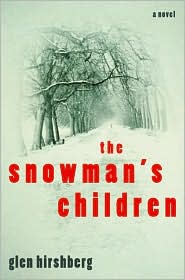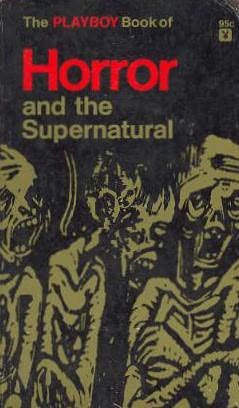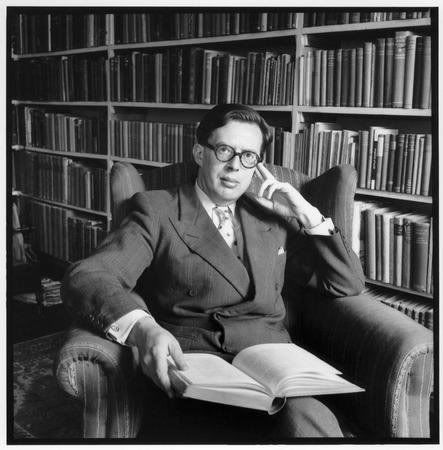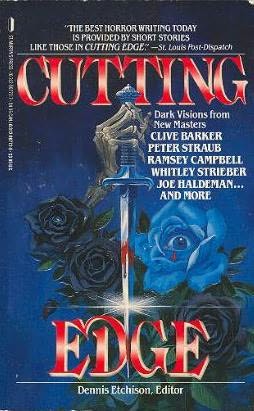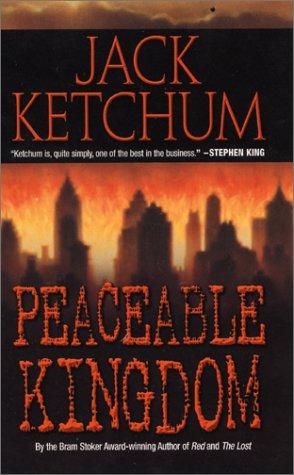 Prior to reading The Man on the Ceiling, I had read four short stories by Steve Rasnic Tem, and not one word of fiction by Melanie Tem. That was a mistake, because this book -- which is part memoir, for lack of a better word, and part novel, also for lack of a better word -- is about them, and their lives together with their five adopted children, and why they write what they write. And what they write, for the most part, is horror. So, not being overly familiar with their fiction before tackling this book was a mistake, but not a fatal one, because despite that I found the book to be absolutely gripping, unsettling, and deeply moving.
Prior to reading The Man on the Ceiling, I had read four short stories by Steve Rasnic Tem, and not one word of fiction by Melanie Tem. That was a mistake, because this book -- which is part memoir, for lack of a better word, and part novel, also for lack of a better word -- is about them, and their lives together with their five adopted children, and why they write what they write. And what they write, for the most part, is horror. So, not being overly familiar with their fiction before tackling this book was a mistake, but not a fatal one, because despite that I found the book to be absolutely gripping, unsettling, and deeply moving.The dedication page for The Man on the Ceiling says this:
For our children, who gave us their blessing
The very next page also contains one sentence only:
Everything we're about to tell you here is true
This second line, in one form or another, will pop up again and again throughout the book, although not everything within its pages is actually, literally true. The Tems describe The Man on the Ceiling as a"biography of their imaginations", and that's about as good a way to describe this highly unusual book as any I could come up with. It begins, for instance, with Steve (the book, incidentally, sometimes alternates between his point of view and Melanie's, while other sections are written by them together) describing a car trip with his family, Melanie riding shotgun, and their children piled in the back.
Along the side of the road, as far as the eye could see, the children waited. Some of them were babies, owning nothing but the baskets they were in and their own dirty blankets. Sometimes the older kids -- and by "older" I mean two or three
 years of age -- would take care of them, holding and singing to them because that came instinctively, feeding them out of other people's garbage cans.
years of age -- would take care of them, holding and singing to them because that came instinctively, feeding them out of other people's garbage cans....Outside the car windows the children came in droves. Some had barely escaped house fires: you could see places on their necks bubbled like a plastic toy left on the stove. Some had crawled out of floods or earthquakes, their faces smeared and broken.
...There was no more room in the car. I wanted to stick my head out the window and tell them that, and somehow apologize for it, but frankley there were so many I was afraid...
All of their children, as I said, were adopted: Gabriella, Joe, Veronica, Chris and Anthony. Chris, they tell us, has spent most of his adult life in prison. Anthony died. And it's possible -- though his parents will never know the truth -- that this nine year-old boy committed suicide.
This book is exceptionally difficult to describe. There is no straight narrative line, it bounces from the childhoods of the Tems, to their feelings about Anthony's death, to the future, to a recounting of the worsening Alzheimer's of Melanie's father, to the death of their cat, to their grappling with the man on the ceiling, who follows them wherever they go.
To say that the man on the ceiling is a personification of the fear the Tems feel not only for their children, but for themselves and the disasters that occur within every family at some point, would be accurate, as far as it goes. But the Tems never state that plainly, and it feels somehow wrong for me to do it in their place. This is how Melanie describes her relationship with the man on the ceiling:
The man on the ceiling gives my life an edge. He makes me uneasy; he makes me grieve. And yet he also fills me with awe for what is possible. He shames me with his glimpses into the darkness of human cruelty, and he shocks me when I see bits of my own face in his. He encourages a reverence when I contemplate the inevitability of my own death. And he shakes me with anger, pity, and fear.
Much of the book is like this, which is to say a description of the way the Tems's imaginations shape their experiences and filter into their fiction, although at no point do they explicitly tie their experiences, fears, or losses to any particular novel or story that one or the other of them has written. They never even mention a single title. However, scattered throughout this book are little short stories that each has written to illustrate, or extrapolate from, an idea, as with Melanie's story "Just Her Size", which
 imagines an encounter she never had with a neighborhood teenager she barely knew when she was a child, who she later learned might have been a pedophile, or in "The Yellow Dog", when Melanie wonders about how her daughter Gabriella must have processed the fact that, as a young girl, she was a witness to the deaths of both the family cat and Melanie's father.
imagines an encounter she never had with a neighborhood teenager she barely knew when she was a child, who she later learned might have been a pedophile, or in "The Yellow Dog", when Melanie wonders about how her daughter Gabriella must have processed the fact that, as a young girl, she was a witness to the deaths of both the family cat and Melanie's father.As for Steve, I felt a particular kinship with him. He is a man who lives in an almost constant state of fear and worry -- sometimes a mild form, sounding somewhere in the back of his mind like the background hum of an air conditioner, sometimes clanging like a fire alarm -- that something terrible is about to happen to someone he loves. Hints are given in the book that Steve had a very rough childhood, and I had a very happy one, but I still understand living inside your own head like that. In one of the sections that seems to have been written by both of them, they talk about how, when the fear and worry gets too strong for him, Steve gets into his car and goes for a drive:
The man on the ceiling is out there, on the ceiling of the world, masquerading as a star or a flock of night birds or the wingtip of lights of a doomed plane, just waiting for the right moment to squash itself against Steve's windshield and make him drive off the road or into oncoming traffic, into the path of cars carrying everyone he's ever loved.
Okay, I'm not as bad as all that, but I do understand it. Hell, everyone does, to one degree or another. Some people are just better than others at turning down the alarm.
Steve writes about writing more than Melanie does (though I feel like most of the short stories included here were written by Melanie), and when he does this his prose turns towards the surreal -- which, I'm lead to understand, is not an unusual direction for his fiction to take). And when he writes about his life as a father, he is absolutely heartbreaking:
My baby. You hold their small hearts, their lungs in your hands and it is unimaginable: both their lives and their deaths are unimaginable. How they came to be out of nothing and how this miracle has been put into your undeserving hands to nourish or to fail. Sometimes it brings the absolute best out of people and sometimes the absolute worst. I've seen people snap under the pressure, we've all seen them, dissolving in the presence of a miracle.
Clearly, I've let the Tems write a fair chunk of this post, but I feel as though that's as it should be. The Man on the Ceiling is so completely theirs that to try and interpret or analyze it would be a greivous error. What you do is, you just let the book absorb you into it. And you learn, among many other things, why the Tems write horror. This book is not a horror novel, but it was borne from horror. It doesn't explain why everyone writes horror, nor does it explain why readers such as myself read it (though it comes closer than anything else I've ever read). And quite frankly, to say -- as I very nearly did -- that this book was produced by the horror genre would be to give that genre far, far more credit than it deserves. This book was written by the Tems, and I feel like it would exist, as would their other books, whether the genre existed or not.
-------------------------------------------------------------------------------------
Well, that's it, folks. The end of The Kind of Face You SLASH!!. And thank Christ for that. It's been fun (sometimes), and educational (for me, anyway), and long as shit. And now it's over. And I am never doing this again.




